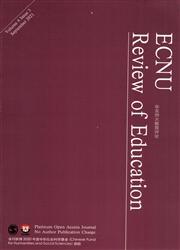The Potential Impact of ChatGPT on Education: Using History as a Rearview Mirror
IF 2.6
Q1 EDUCATION & EDUCATIONAL RESEARCH
引用次数: 0
Abstract
Highlights This review compares generative artificial intelligence with five representative educational technologies in history and concludes that AI technology can become a knowledge producer and thus can be utilized as educative AI to enhance teaching and learning outcomes. From a historical perspective, each technological breakthrough has affected education by changing how symbols are represented and how knowledge is carried. The emergence of new educational technology is always accompanied by doubt, vigilance, and rejection from the traditional community. The new educational technology, generative artificial intelligence, interacts with the old, creating an increasingly complex ecology of educational technology. Three suggestions are proposed for adjusting the education system: first, promoting small-scale, individualized, and conversational teaching in schools; second, developing teachers’ and students’ digital literacy in a multi-curricula system; and third, conducting research on grading and classification standards for the application of AI in education.聊天技术对教育的潜在影响:以历史为后视镜
本文将生成式人工智能与历史上五种具有代表性的教育技术进行了比较,得出结论认为人工智能技术可以成为知识生产者,因此可以作为教育人工智能来提高教学成果。从历史的角度来看,每一次技术突破都通过改变符号的表现方式和知识的传播方式来影响教育。新的教育技术的出现总是伴随着传统社会的怀疑、警惕和排斥。新的教育技术,即生成式人工智能,与旧的教育技术相互作用,创造了一个日益复杂的教育技术生态。提出了调整教育体制的三点建议:一是在学校推行小规模、个性化、对话式教学;第二,在多课程体系下培养教师和学生的数字素养;第三,研究人工智能在教育中的应用的分级和分类标准。
本文章由计算机程序翻译,如有差异,请以英文原文为准。
求助全文
约1分钟内获得全文
求助全文
来源期刊

ECNU Review of Education
Social Sciences-Education
CiteScore
4.90
自引率
0.00%
发文量
41
审稿时长
10 weeks
 求助内容:
求助内容: 应助结果提醒方式:
应助结果提醒方式:


